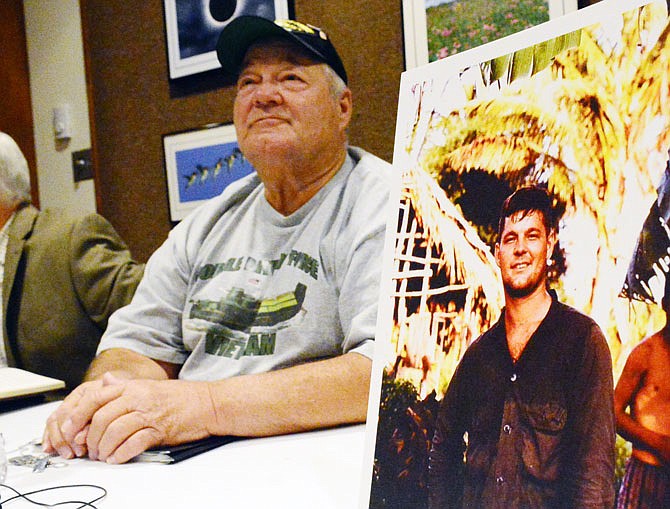Retired Air Force colonel and former state Rep. Jack Jackson told about 170 people gathered at the Missouri River Regional Library that he had prepared something to say Thursday night.
But, preceding him were seven Vietnam War-era veterans who had just shared their stories.
"What you've shared here today," Jackson said, "it made my heart ache, but I was so proud to be able to stand with you.
"Welcome home."
The evening seminar called "Strength and Honor: Reflections from Veterans of the Vietnam War" was co-sponsored by MRRL and Operation Bugle Boy - a nonprofit organization that honors veterans, soldiers and first responders. The event was intended to increase public awareness and appreciation of the service, courage and sacrifices service personnel made during the war, why America got involved in the war and the importance of supporting troops the country has put in harm's way.
Roger Thompson, a U.S. Navy veteran from Russellville and one of the panelists, broke the tension when he stood up to speak.
"I think one of the best recruiters the United States ever had," Thompson joked, "was a magistrate judge. He told us guys it would be better if we went into the service."
After training, he was stationed on the USS Hollister, a destroyer.
The Hollister followed aircraft carriers, participated in shore bombardment and plucked downed pilots from the oceans. During the time he was aboard, the ship traveled more than 17,000 miles and used more than 5 million gallons of fuel, he said. It fired 10,900 rounds of ammunition. It captured 88 prisoners of war.
But, at a point when the ship pulled alongside an aircraft carrier for fuel, Thompson was told he'd received orders and was to board the carrier.
What he found out was he was to be put on a boat. He started out in a World War II-era landing craft called a Landing Craft Mechanized (LCM), which was capable of beaching the front on a bank and dropping the front to unload troops and equipment.
The boat he was on weighed 66 tons, but could float in 3 feet of water. It was equipped with eight machine guns.
The boat's mission was to take troops upriver.
"We'd beach them on the river bank, and the troops would run out in the jungle on search-and-destroy missions," Thompson said. "That was one way to stop supplies to North Vietnam."
Enemies would set up ambushes in places where the U.S. soldiers couldn't fire at them because there were villages in the line of fire.
Some missions, the boat would take doctors upriver. The doctors would go into the villages and give medical assistance to children. That was one of the "coolest things" the soldiers did, Thompson said.
"The (Viet Cong) would come through and tell the village people that the soldiers ate babies," he told listeners, and chuckled as he continued. "We never ate babies, I'll guarantee you."
Another panelist, U.S. Marine Corps veteran Raul Delgado, had been a crew chief aboard a CH-46 helicopter with the Purple Foxes in Vietnam.
Delgado said when he returned home, he found America was not the same country that had sent him off to war. No one welcomed him home.
"I loved this state, because you guys welcomed everybody home," he said.
He said he didn't go home for 35 years after he got out of the service.
"I lived in Chicago and loved the city, loved the people there, loved the families that I had there," Delgado said. "But, I didn't want to be put through all the questions that I would have to explain to somebody."
What could he say? What could he do? What could he say to the family?
"The Raul that they knew - he was dead. He didn't exist anymore," Delgado said.
A mission that haunts him to this day involved the helicopter landing outside a Vietnamese village. He went to pick up a young Vietnamese girl who had a chest wound and needed to go to the hospital.
He was happy to provide the service. The mother handed the girl over. The girl had been shot. He put the girl in the helicopter as comfortably as he could. As the helicopter landed at a Vietnamese mobile hospital, he realized the girl had died.
"I will never forget that look in the mom's eyes," he said. "I pray the mom got the little girl back."
Although, he's not confident that happened.
Richard Heidbreder, a U.S. Air Force veteran, said he still remembers the Air Force recruiter's comments as he was graduating in 1965. The recruiter came to Russellville and received commitments from five guys out of a class of 65, Heidbreder said.
"So, you're going to learn a trade. You're going to have a good time. And, it's going to be fun," he said. "So, we signed up."
They went to Lackland Air Force Base in San Antonio, Texas for basic training.
"We found out then - recruiters' words were all a bunch of hogwash," Heidbreder said.
What the veterans shared with listeners Thursday night were memories they probably had never shared with anybody else, Jackson said.
He advised people listening to look into veterans' eyes.
"Look in their eyes," he said. "You will see their souls."

